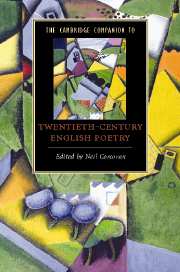Book contents
- Frontmatter
- Introduction
- Part I Contexts
- Part II Moderns
- Part III Modernists
- Part IV Later Modernities
- 10 Philip Larkin: a late modern poet
- 11 R. S. Thomas and modern Welsh poetry
- 12 Gender, feminism, poetry: Stevie Smith, Sylvia Plath, Jo Shapcott
- 13 Varieties of poetic sequence: Ted Hughes and Geoffrey Hill
- 14 Black British poetry and the translocal
- 15 Poetry and class: Tony Harrison, Peter Reading, Ken Smith, Sean O’Brien
- 16 A Scottish Renaissance: Edwin Morgan, Douglas Dunn, Liz Lochhead, Robert Crawford, Don Paterson, Kathleen Jamie
- 17 Lyric adaptations: James Fenton, Craig Raine, Christopher Reid, Simon Armitage, Carol Ann Duffy
- Index
12 - Gender, feminism, poetry: Stevie Smith, Sylvia Plath, Jo Shapcott
from Part IV - Later Modernities
Published online by Cambridge University Press: 28 January 2008
- Frontmatter
- Introduction
- Part I Contexts
- Part II Moderns
- Part III Modernists
- Part IV Later Modernities
- 10 Philip Larkin: a late modern poet
- 11 R. S. Thomas and modern Welsh poetry
- 12 Gender, feminism, poetry: Stevie Smith, Sylvia Plath, Jo Shapcott
- 13 Varieties of poetic sequence: Ted Hughes and Geoffrey Hill
- 14 Black British poetry and the translocal
- 15 Poetry and class: Tony Harrison, Peter Reading, Ken Smith, Sean O’Brien
- 16 A Scottish Renaissance: Edwin Morgan, Douglas Dunn, Liz Lochhead, Robert Crawford, Don Paterson, Kathleen Jamie
- 17 Lyric adaptations: James Fenton, Craig Raine, Christopher Reid, Simon Armitage, Carol Ann Duffy
- Index
Summary
In November 1962, three months before her death, Sylvia Plath wrote to Stevie Smith: 'I better say straight out that I am an addict of your poetry, a desperate Smith addict.' This addiction had been fed by her experience of listening to the recordings that Smith had made for the British Council with Peter Orr a year earlier, a task that Plath was now similarly engaged in. In the interview with Orr that Plath recorded concurrently she noted that her own recent poems were written by being spoken aloud and how 'wonderful' the new development was of 'recording poems, of speaking poems at readings, of having records of poems'. That Plath was particularly impressed by the sound of Smith's poems - whether we mean by that Smith's remarkable reading of her own poems, or the way the poems themselves indicate the spoken voice - is confirmed in an article that Plath had written earlier in the same year for the London Magazine where Smith is grouped alongside Lowell, Roethke and Bishop as poets who seem to invoke the physical production of voice:
The poets that I delight in are possessed by their rhythms as by the rhythms of their own breathing. Their finest poems seem to be born all-of-a-piece, not put together by hand: certain poems in Robert Lowell's Life Studies, for instance, Theodore Roethke's greenhouse poems; some of Elizabeth Bishop and a great deal of Stevie Smith.
The word 'possession' echoes the 'addiction' which Plath had lightheartedly confessed to Smith. The sense of the poet or person surrendering to some other force suggests a Romantic tradition of poetic inspiration; however, this tradition, with its exulting of the masculine subject, could also work to re-inscribe feminine subordination: 'I married a real poet, and my life is redeemed: to love, serve & create.'
- Type
- Chapter
- Information
- The Cambridge Companion to Twentieth-Century English Poetry , pp. 173 - 186Publisher: Cambridge University PressPrint publication year: 2007
- 2
- Cited by

